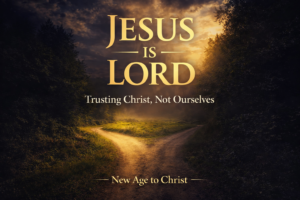⏱️ Estimated Reading Time: 5 min read
For many years, I lived in South Florida where a beautiful sunny day can change in a moment, as ferocious storm clouds roll in from what seems like nowhere. And though it happened every summer afternoon, I often found myself caught off guard and unprepared. I never had an umbrella available and usually had a pair of shoes on I didn’t even want to get wet, much less wear through ankle-deep puddles.
Catastrophic events almost always come upon us like this. On an otherwise sunny day, tragedy knocks us down like the fierce winds of an afternoon thunderstorm. We lose a job when we least expect it. A relationship is fractured. A dream is dashed. We find ourselves thinking, “This wasn’t supposed to happen!” or “Why God?” or “This isn’t fair!”
Jonah and the Vine
The prophet Jonah had a similar response as he waited to see what God would do with the city of Nineveh. After he finally—reluctantly— complied with God’s command and called the Ninevites to repentance, he left Nineveh to wait and watch:
“Jonah went out of the city and sat to the east of the city and made a booth for himself there. He sat under it in the shade, till he should see what would become of the city. Now the Lord God appointed a plant and made it come up over Jonah, that it might be a shade over his head, to save him from his discomfort. So Jonah was exceedingly glad because of the plant. But when dawn came up the next day, God appointed a worm that attacked the plant, so that it withered. When the sun rose, God appointed a scorching east wind, and the sun beat down on the head of Jonah so that he was faint. And he asked that he might die and said, “It is better for me to die than to live.” But God said to Jonah, “Do you do well to be angry for the plant?” And he said, “Yes, I do well to be angry, angry enough to die.” (Jonah 4:5-9)
Jonah was spent, physically and emotionally, from his experience in the storm at sea, in the belly of the great fish, and in preaching to a city of people whom he feared more than God. So God graciously provided a vine to shade Jonah from the sun. It was a gift that comforted Jonah. While God knew he needed rest and shade, God also knew he need more. God then sent a worm that ate up the vine and ultimately his shade from the sun. This angered Jonah. He had been taking for granted the gift God had given him until it was taken away. Then, he responded in anger as if he deserved the shade God had given his as a gift. In essence, he loved the gift more than the Giver. In other words: idolatry.
The Vines We Cling To
There are many good things God gives us in our life that bring us comfort, joy, meaning, purpose, and satisfaction. Sometimes, we can enjoy those things so much, they become disordered affections in our heart, idols that we love and cherish more than God. Any of God’s good gifts can become idols: friendships, ministries, jobs, possessions, and even our hopes and dreams.
Sometimes, God removes those gifts from us, as he did for Jonah. Sometimes, he places barriers and obstacles between us and those gifts, keeping us from them. We may not realize how much hope we place in God’s good gifts until he removes them or keeps us from us. How we respond reveals something significant about our heart. Our emotional response is often an indicator of idolatry. For example, we may respond in anger when something we desire is taken from us. We might react in despair or self-pity when we lose something we think we need. We may even respond in fear when something we cling to is threatened. In Jonah’s case, not only had the vine become a source of hope to him, but it pointed to an even deeper idol. He was angry with God for saving the Ninevites because he thought their salvation would threaten the safety and security of his own people.
The human heart is prone to idolatry; we come by it naturally in our sin nature. We easily wander from God, the source of our hope, meaning, and life. That’s why, as he did with Jonah, God removes our vines, giving us the opportunity to see the true state of our heart and our need of grace. In doing so, it’s as though he is asking us what he asked Jonah, “Do you do well to be upset about that loss?”
Everything we trust in for life and hope outside of God will fail us; everything else will wither and die and leave us wanting. That’s why removing our vines is an act of grace. In doing so, God shows us that no vine could ever provide the joy found in knowing him and being known by him. No vine could ever give us the life we have in Christ. No vine can give us the meaning, purpose, and satisfaction found only in our union with Christ.
When we lose something we’ve put our hope in, we have an opportunity to see the vine for what it was: an idol of the heart. We can then turn back to our first love, to the One who made us and saved us. In him, we find lasting hope and life. Only then can we can say with the Psalmist, “Whom have I in heaven but you? And there is nothing on earth that I desire besides you. My flesh and my heart may fail, but God is the strength of my heart and my portion forever.” (Psalm 73:25-26.)
Editors Note: Please pick up Christina’s latest book Idols of a Mother’s Heart (Christian Focus, 2018).




